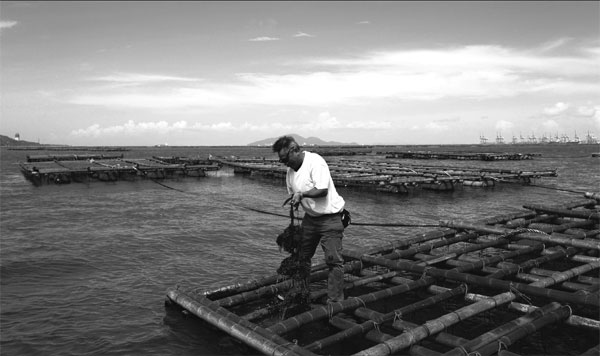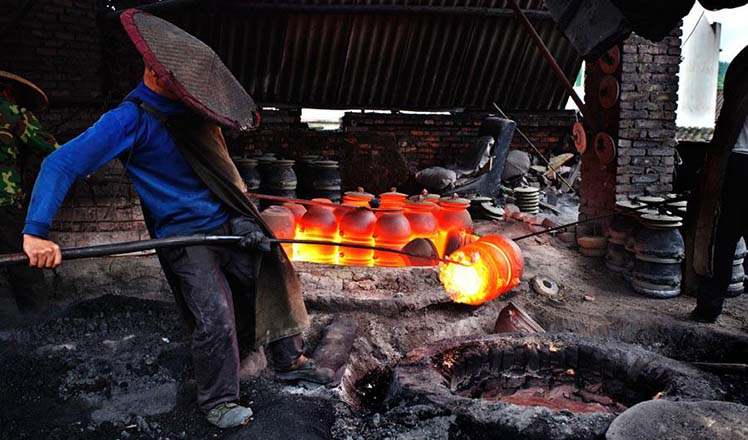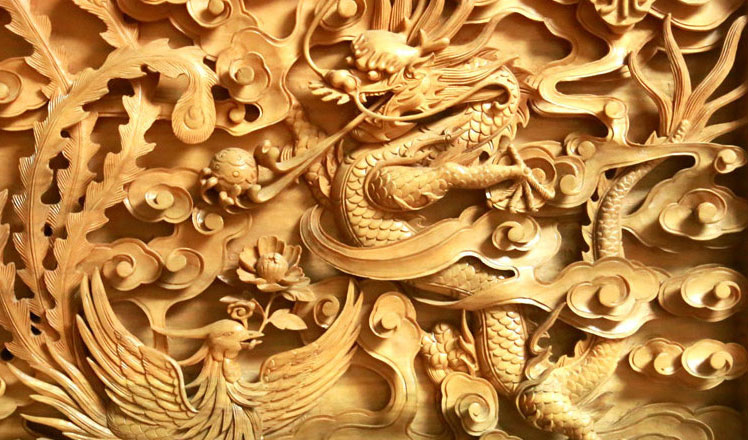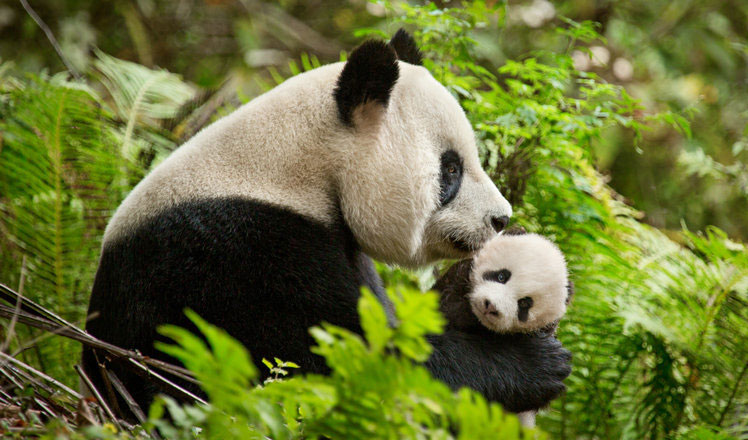Saving oysters from disaster
Updated: 2016-08-12 11:21
(China Daily)
|
|||||||||

It's another record-breaking summer and Tang Yuk-kee is afraid he might be headed for another bad oyster harvest this year. At 9 o'clock on a July morning, he fired up the engine of his boat and headed out to sea. It was high tide, the perfect time to cruise around the mudflat and check in on the oysters he had been cultivating in Deep Bay, Yuen Long, across the waters from Shenzhen.
Tang is a cross-border float fisherman. Now in his fifties, he's the third generation of his family to earn a livelihood from oyster aquaculture, an industry that has thrived in Hong Kong for 700 years. He may be the last in his family earning his living this way. Oyster farming is in decline around the globe - a sunset industry that has fallen out of step with the times.
"In the golden era during the 1960s and 1970s, there were almost a thousand fishermen rearing oysters in Deep Bay. Now less than 50 are left," Tang said, souping up his steamboat, turning toward an area ahead where dozens of bamboo rafts were bobbing on the water. Strings of oysters, linked together by ropes, hung under the water, suspended from the rafts.
"This creature is very sensitive to the surroundings," Tang said, lifting a string of oysters to check their growth. The veins bulged out on his arms, with pinpricks of sweat, shining under the sun.
In the 1980s the oyster industry went through some bad times. Industrial pollution turned the water into a cesspool. Things started improving around the millennium, but in the last few years the harvest has become irregular and production unstable.
"This is a visible sign of climate change," explained Vengatesen Thiyagarajan, associate professor at the School of Biological Sciences and resident scientist in the Swire Institute of Marine Science at the University of Hong Kong. He said the changing conditions have become more and more obvious in recent years, presenting the oyster farming industry with new challenges.
"Oyster farmers will suffer damage more frequently, and at greater intensity in the near future," he predicted. Thiyagarajan has spent almost two decades studying marine science, specializing in oyster aquaculture in a time of climate change.
Declining pH level
Deep Bay is a U-shaped shallow bay, largely surrounded by wetlands. Fresh water from the inter-tidal channels of the city's inland empties into the bay, merging with the sea water to form a natural seabed for coastal oyster aquaculture.
The bay, however, is "sensitive" to the changing climate, even more so than other coastal areas of South China, Thiyagarajan said. With continuous and systematic measures undertaken by the Hong Kong government, the practice of oyster aquaculture here can be a model for other places on the Chinese mainland, which accounts for 90 percent of the world's oyster production, he added.
Compelling evidences show that the pH level of the South China Sea has declined significantly, over the past 50 years due to anthropogenic emission of carbon dioxide. Such a decrease in seawater pH, or ocean acidification, damages the formation of oyster shells and interrupts the growth of oysters, Thiyagarajan said.
Meanwhile, a constant rise of the sea temperature resulting from global warming has disturbed the oysters' reproductive cycle, leading to delayed harvests.
Higher sea temperature also causes pathogens and parasites to proliferate, increasing the frequency of infections, Thiyagarajan added.
The effects were evident last year, the warmest on record in Hong Kong's history. The annual mean temperature hit 24.2 C, 0.9 C above the 1981-2010 normal, according to Hong Kong Observatory.
Mean temperatures last summer and autumn were the highest since record keeping commenced in 1884, with the highest absolute temperature of 36.3 C in August. The extreme hot weather resulted in oysters producing seeds instead of meat.
"The meat of oysters harvested last December was so thin that they failed to reach the common standard," said Tang, who postponed the usual harvest time last December and waited until February this year. But he said he lost sales because the market had cooled down in February.
What makes it worse is an increasing amount of fresh water being discharged from the Pearl River into Deep Bay, leading to lowered salinity of sea water, which also has a harmful effect on the growth of oysters. The additional discharge is caused by heavy rainfall in South China and Hong Kong. Scientists predict the rains will get heavier and more frequent in the future.
"The whole of China will see clearly the impact of climate change (on oysters) in the near future," Thiyagarajan predicted. He warned oyster farmers to change their aquaculture planning to adapt to the changing climate.
"Oyster farmers should research when the temperature is going to be lower next year and how the pH of the ocean is going to change, and accordingly they should change their entire aquaculture practice," Thiyagarajan said. "If not, they may suffer at any time," he emphasized.
Sustaining the species
Thiyagarajan and his team have been working on developing a modernized oyster aquaculture applying science and technology he predicts will achieve "sustainable oyster aquaculture".
An important part of the program is to set up a hatchery which will permit selective breeding so that oysters will survive the changing climate and the threat of infections. Harvested oysters will go through a purification system to remove bacteria, Thiyagarajan said.
Chan Yu-tong, chairman of the Deep Bay Oyster Cultivation Association, is cooperating with Thiyagarajan on transforming the traditional approach to oyster cultivation. A float fisherman himself, Chan has observed the same risks and environmental effects on oysters as Tang.
He believes the oysters raised in the modern way are "superior products" that will become the top brand in the market. Chan applied for HK$3 million in government funding so he can build a factory near Deep Bay and set up a hatchery and purification system.
The government, which set up a HK$500 million subsidy program in 2013, seems to have recognized value in Chan's project. His project has received "approval in principle", according to government documents.
As of April 26, 2016, six projects, with a total of about HK$28.3 million, have been granted funding. One is Chan's depurated oyster project planned for Deep Bay. The 2016 Policy Address pointed out the government will continue to encourage use of the fund and provide technical support and training for those engaged in fishery operations.
Everything seems to be proceeding on course. Chan is readying to apply to the Lands Department for a change of land use for the hatchery.
Still, some fishermen including Tang are struggling. With decades of oyster aquaculture behind him by way of a family inheritance, Tang has doubts about transforming oyster aquaculture through technology.
He said oyster seeds cultivated in a hatchery have "weak vitality", contrasting sharply with Professor Thiyagarajan's theory that the quality of the seeds is almost the same, or may "even be much better".
Tang also called the purifying system into question, saying harvested oysters can be cleaned up by putting them in fresh water with salt and starch. "Germs and bacteria all come out after minutes of soaking," he said. "And you never eat a raw oyster," he warned.
Unlike Tang, Chan is optimistic about the new way of cultivating. He anticipates strong sales of the new product. "The price can be very competitive," he continued.
The current average price of local oysters is HK$3,000 to HK$4,000 per ton in Hong Kong, while the price of imported oysters is about HK$20 a piece. Chan estimated the price of the new product would be set at about HK$10 to HK$15 per piece.
"The new product has a comparable standard with those imported from other regions, but comes with a lower price. The taste is much better as the oysters are processed and transported locally," Chan said.
Contact the writer at sylvia@chinadailyhk.com
- Nepal's newly elected PM takes oath
- Texas gun law worries incoming students
- China vows to deepen economic, trade cooperation with ASEAN
- Fire guts Emirates jet after hard landing; 1 firefighter dies
- Egypt's Nobel-laureate scientist dies of illness in US
- THAAD muscle flexing unmasks anxiety over declining hegemony
 Phelps writes new page with four wins in same event
Phelps writes new page with four wins in same event
 Ma Long wins Chinese derby to edge defending champion
Ma Long wins Chinese derby to edge defending champion
 Yingjing County's hand-crafted 'black pottery'
Yingjing County's hand-crafted 'black pottery'
 Ten photos from around China: Aug 5 – 11
Ten photos from around China: Aug 5 – 11
 Inheritor of Songshan wood carving in C China
Inheritor of Songshan wood carving in C China
 "Born in China": Wild and fun
"Born in China": Wild and fun
 Top 10 foreign destinations for Chinese tourists
Top 10 foreign destinations for Chinese tourists
 Ding Ning wins table tennis gold in Rio
Ding Ning wins table tennis gold in Rio
Most Viewed
Editor's Picks

|

|

|

|

|

|
Today's Top News
Phelps puts spotlight on cupping
US launches airstrikes against IS targets in Libya's Sirte
Ministry slams US-Korean THAAD deployment
Two police officers shot at protest in Dallas
Abe's blame game reveals his policies failing to get results
Ending wildlife trafficking must be policy priority in Asia
Effects of supply-side reform take time to be seen
Chinese State Councilor Yang Jiechi to meet Kerry
US Weekly

|

|









